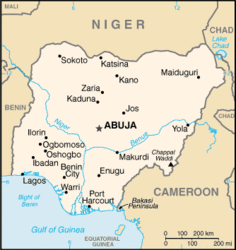This article appears to be slanted towards recent events. (October 2020) |
| Special Anti-Robbery Squad | |
|---|---|
| Abbreviation | SARS |
| Agency overview | |
| Formed | 1992 |
| Dissolved | 11 October 2020 |
| Jurisdictional structure | |
| Operations jurisdiction | Nigeria |
 | |
| Nigeria | |
| Size | 923,768 km2 |
| Population | 206 million |
| Governing body | Ministry of Police Affairs |
| Constituting instruments |
|
| General nature | |
| Operational structure | |
| Headquarters | Louis Edet House, Abuja |
| Website | |
| www.npf.gov.ng | |
The Special Anti-Robbery Squad (SARS) was a Nigerian Police Force unit created in late 1992 to deal with crimes associated with robbery, motor vehicle theft, kidnapping, cattle rustling, and firearms. It was part of the Force Criminal Investigation and Intelligence Department (FCIID), headed by the then Deputy Inspector General of Police Anthony Ogbizi.[1]
SARS was controversial for its links to extrajudicial killings, forced disappearances, extortion, torture, framing, blackmail, kidnapping, illegal organ trade, armed robbery, home invasions, rape of men and women, child arrests, the invasion of privacy, and polluting bodies of water with the illegal disposal of human remains. SARS was investigated several times in response to protests, but without results; reforms were promised in 2016, 2017, 2018, and 2019.[2][3] The unit was disbanded on 11 October 2020 after worldwide protests under the motto "End SARS" occurred.[4][5]
- ^ "How I founded SARS in the Police – RTD CP Midenda". Vanguard News. 23 December 2017. Retrieved 25 February 2020.
- ^ Olatunji, Jacob (5 October 2020). "For fourth time in 4 years, IGPs ban SARS". Nigerian Tribune. Ibadan, Nigeria. Archived from the original on 7 October 2020.
- ^ Malumfashi, Sada (22 October 2020). "Nigeria's SARS: A brief history of the Special Anti-Robbery Squad". Al Jazeera. Archived from the original on 22 October 2020.
- ^ "The Killing Force: Nigeria Police Turn Their Guns on Defenceless Citizens". P.M. News. 7 November 2011. Retrieved 26 February 2020.
- ^ Salami, Lawal (19 December 2019). "Hands in the hair: Nigerian police and men with dreadlocks". Global Comment. Retrieved 26 February 2020.